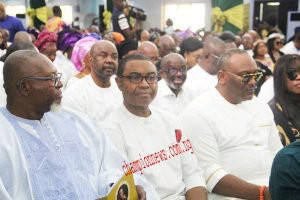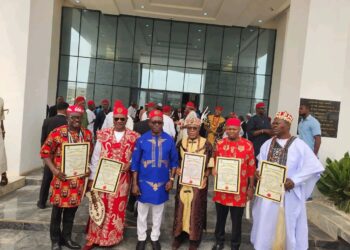Nnewi, ANAMBRA- Call it weird or perhaps audacious, a church dedicated to the worship of Ogbanje has sprung up in Nnewi, Anambra State.
This new beginning is weird as Nigerians have refused to identify with their ancestral gods, choosing to align with Christianity or Islam, the two most popular religions in Nigeria today. It may be seen as audacious as Chukwuemeka Cyril Ohanaemere, popularly known as Odùméje, general overseer of The Mountain of Holy Ghost Intervention and Deliverance Ministry, the riquid metal and Indaboski bahose as he fondly describes himself, may use them for another of his ‘all idles (idols) must die’ stunts. They are neighbours, so a flex of muscle may not be out of place. Most recently, reports of the traditional religious festival being thwarted by a group led by an Islamic cleric in Ilorin, Kwara State, wagged some tongues, albeit most afraid to come clean on what they think about the intrusion, if I may describe it as so.
Ogbanje, a word so popular in my early years due to a particular Christian song giving all glory to God and describing others as powerless, literally means ‘children who come and go’ in Igbo and is sometimes used to describe naughty children. Wikipedia says it is often translated as changeling due to the similarities they share with fairy changelings of Celtic and broader European mythology.
One of the Ogbanje Church of All Nations’ services trended on social media last Sunday. It was a colourful affair, with songs led by a ‘pastor’ or let’s call him a clergyman. It seemed like a Christian Sunday service as the congregation sang praises to different gods. In their defence, the clergyman, whose name is unknown, perhaps for security reasons or one of their doctrines/beliefs, said:
“People usually sing and dance to songs composed with names and places in the Bible while they do not actually know who, what, or where they are and what they represent. It is high time we started going back to our culture and tradition.
“People should start singing songs composed with names of rivers that are known to them and the goddesses of those rivers, rather than singing and dancing to the names of what they don’t know.”
He claimed members of his faith always shine and prosper because they worship the rivers and goddesses of the rivers they know and not those they are not familiar with. In his defence, I think he is right. Before we start shaking our heads in disbelief, calm down; I’ll explain.
Merchants from North Africa and the Senegalese basin introduced Islam to what is now Nigeria during the 11th century, and it was the first monotheistic Abrahamic religion to arrive. Christianity came to Nigeria in the 15th century through Augustinian and Capuchin monks from Portugal. The first mission of the Church of England was, though, only established in 1842 in Badagry by Henry Townsend. Before these religions came to Nigeria, it is certain that the inhabitants of the geographical entity, before it was amalgamated by Lord Frederick Lugard in 1914, for which many Nigerians still curse him to date, had some supreme beings they worshipped or communed with. It is unfair to assume such gods, who held the fort before our now major religions came, are irrelevant or have expired. While I’m no religious aficionado, I’ll say it is safe to conclude these gods answered prayers to some extent, although they surprisingly could not prevent colonialism and the slave trade; that’s a discussion for another piece.
The killing of Christians accused of blasphemy by Muslims had raised dust, with many advocates of religious tolerance having a field day on national dailies and blogs. Notably, Deborah Samuel was burned to death for kicking against the sharing of Islamic messages in a ‘school study group’. Sad, barbaric, callous, uncivilized and many other damning adjectives were used to describe the killers until the police were pressured into arresting some ‘suspects’. But as usual, Nigerians forget easily, and the matter has since been swept under the carpet. Recently, musician Davido was also labelled a blasphemer for sharing a music video of one of his signees showing some ‘Muslims’ praying. The videos gathered condemnation in truckloads and sprang up the ‘Arewa Muslims’ versus ‘Southern Muslims’ discussion for the umpteenth time, with many bandying the opinion that the latter are more tolerant than the former. Inter-religious marriage is a no-go area for both religions.
Christians themselves are not left out, with many even advising their members against eating Sallah ram, with the claim that it is a sacrifice to an unknown god, sometimes said to be the god of the moon (I guess this must have come from the crescent moon synonymous with Islam). Inter-religious marriage is the worst, ‘you cannot marry an unbeliever’ is the chorus. Surprisingly, although Christians all believe in God and Jesus Christ, they still segregate among themselves. Isn’t it shocking that a Catholic is advised against marrying outside the fold? Or Pentecostals against marrying Catholics and other Orthodox churches? We all believe in Jesus Christ and pray in his name to God, who we refer to as father, so why the segregation?
Just recently, the Oluwo of Iwo, supposedly a custodian of Yoruba culture, banned traditional worship in his domain. He had, some time ago, claimed he is of God, denouncing the gods who his ancestors worshipped. Similarly, the ‘battle of Ilorin’ culminated in the Emir of Ilorin taking sides, you already with whom he aligned.
However, traditionalists, who many religious adherents believe carry lifetime visas to hell and its other territories, appear to be the most tolerant. Although some Oro worshippers attacked some churchgoers in the Ikorodu area of Lagos some time ago, it is less common that they infringe on the rights of others to worship or practice their religions. They simply face their Ogbanje or other gods, to each his tent. No unnecessary attacks or self-righteousness. They are arguably the most understanding of how a secular state works. They take their religious values seriously and even welcome both Christians and Muslims to consult their gods despite the holier-than-thou attitude. Many times, we deceive ourselves by openly condemning the traditionalists but secretly consult them for solutions to persistent problems. Or where did ‘cut soap for me’ parlance come from? Yes, it came from traditionalists.
Before we look at the Ogbanje church members as hell bound or less human, it is important to note that we are a secular country, at least we claim to be, and allow people to call on whatever helps them get through the tough situation in Nigeria.






